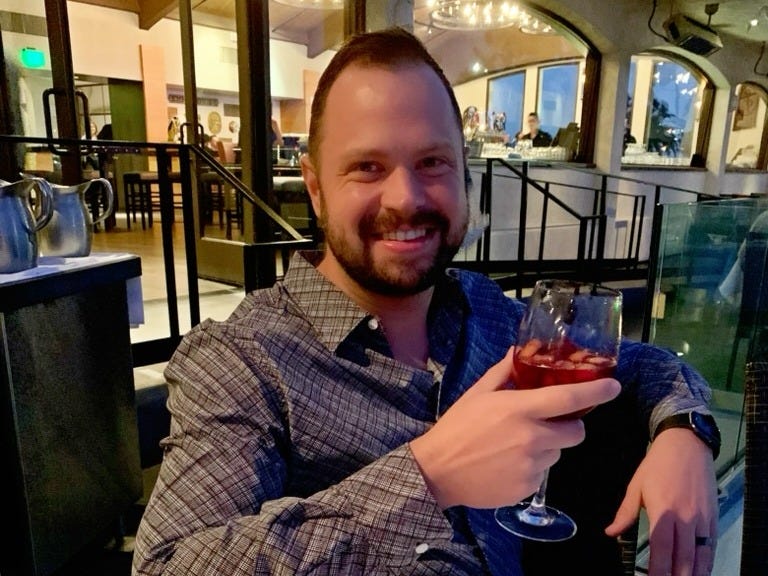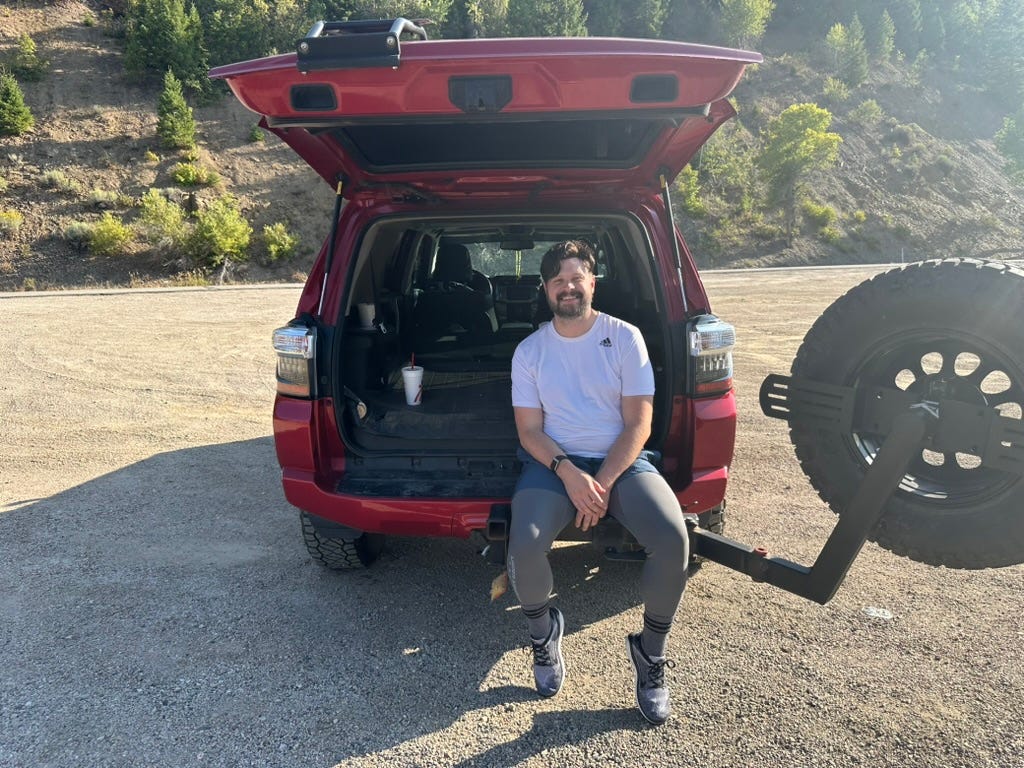The Four-Year Conversation We Never Had
I knew for four years that my marriage was over. So did he. We just never said it out loud.
When our best friends had their baby, I watched something shift in my husband.
Not all at once, more like a door quietly closing. He held their newborn with this careful tenderness, and I saw it in his face: permission dying. Permission to want what I needed him to want.
Having children wasn’t just something I wanted. It was the architecture of the future I’d built in my head. And in that moment, watching him with someone else’s baby, I understood with absolute clarity that he’d made his choice.
It just wasn’t the one I needed.
That was the beginning. The moment I knew. My heart sank. My stomach felt like it fell out of my body.
You know that feeling when you realize something and your whole body goes quiet? Not peaceful quiet—more like that suspended moment right before a car accident when time does something weird and you can see exactly what’s about to happen, but you’re powerless to stop it.
That’s what knowing felt like.
What followed were four years of pretending I didn’t.
The Scripts We Ran
We became very good at not having the conversation.
Every time it bubbled up—and it did, regularly, like a body trying to purge poison—we’d find a different exit. A different way to deflect, defer, delay.
“Let’s revisit this next year when work settles down.”
“We’re still figuring things out.”
“Our friends took their sweet time to be ready, and they’re older than us—why can’t we?”
We developed a whole language of avoidance. I’d recognize his tells when the topic was approaching dangerous territory. He’d recognize mine. We became experts in changing the subject, in finding the conversational off-ramps that kept us safely away from the truth.
The horrible intimacy of it: we were co-conspirators. Co-performers in the same production of “Maybe: The Musical.” Both of us knowing, both of us choosing not to know, both of us protecting each other from the words that would end everything.
I told myself I was being kind. Giving him space. Giving him time.
But I was really giving myself permission to keep avoiding the choice. And honestly? I got really, really good at it. Olympic-level avoidance. Gold medal in the “Let’s Talk About This Later” event. 🥇
What I Was Protecting
I was raised to be the provider. The one who carries the weight. So I took on the role of decision-bearer. If I never forced the conversation, he’d never have to say “I don’t want kids” and own that choice.
I could spare him.
Noble, right? Except I was protecting myself too. Eight years together is a long time. (Except when it turns into 12.) Long enough that ending it felt like admitting those years were leading here all along.
And maybe, if I just gave him more time... maybe if I just became okay with not having kids... maybe if I stopped bringing it up...
Maybe. That word became what felt like a life sentence.
What My Body Knew
While my mind negotiated and justified and postponed, my body kept score.
I got tenser. Month by month, year by year. My shoulders carried weight that had no name. My jaw clenched in my sleep. I started grinding my teeth so hard I cracked a molar. My dentist asked if I was stressed about something. I laughed and said work was busy.
My nervous system was screaming what my mouth refused to say.
But I’d learned to ignore that kind of intelligence. To override physical knowing with mental justification.
Every avoided conversation wound me tighter. Every “let’s revisit this later” added another layer of tension I couldn’t release because I couldn’t name its source.
The Moments We Almost Said It
There were moments when the truth was right there. When it would bubble up between us, undeniable and urgent.
I’d feel it coming. The words forming. The recognition that we both knew what we were avoiding.
And then: “I don’t mean that.”
The immediate retraction. The reflex to protect him from my own knowing. To protect myself from the consequences of saying it out loud.
But I did mean it. Every time.
The truth doesn’t go away just because you refuse to speak it. It just sets up camp in your body and starts charging rent.
What I Told Myself About Kindness
I thought I was being kind by not forcing the conversation.
Patient. Understanding. Giving him the space to come to his own conclusions.
But here’s what I’m learning: you can’t protect someone from truth by avoiding it. You just create a shared fiction that slowly suffocates you both.
Every time I chose his comfort over honesty, I was betraying something. Not just him. Both of us. The relationship we could have had if we’d been brave enough to have the real conversation.
The kindness I thought I was offering—giving him time, sparing him pain—was really just cowardice. Mine, not his.
I was using him as an excuse not to choose. As long as I was “giving him time,” I didn’t have to face the choice myself. I didn’t have to be the person who ended an eight-year relationship over something as “selfish” as wanting children.
I could stay in maybe. I could avoid being the villain in my own story.
But my body was keeping a different kind of time. Getting tenser. Winding tighter. Trying to force the conversation my mind kept postponing.
What Finally Broke
Four and a half years after I knew, he finally asked:
“Something is really bothering you, and it’s time for you to talk to me about it.”
He knew. Of course he knew. We’d both known for years. But this was the first time either of us had invited the truth into the room without immediately showing it the door.
I could have deflected again. Found another exit. Pushed it down one more time and said “I’m fine, just stressed about work” or whatever script we’d been running for years.
But I couldn’t. My body simply refused to perform anymore.
Not because anything had changed in my circumstances. Not because I’d had some breakthrough in therapy or found some new framework for understanding myself. Nothing dramatic shifted. No catalyst. No permission granted from the outside.
The truth had just become more persistent than my ability to ignore it. Aliveness works like that—it’s not an emotion you can wait out. It’s information that keeps showing up, getting louder, more insistent, until you either listen or break.
I’d wanted to be a dad since I was very little. That wanting wasn’t negotiable. It wasn’t something I could compromise on or talk myself out of or sublimate into other forms of meaning.
And I couldn’t pretend anymore that everything between us was okay when something fundamental—something at the very architecture of why I’d gotten married in the first place—was violated.
So when he asked, I told him.
I gave him one last chance to say he wanted kids. We both knew it would be a lie if he said it. But I offered the exit anyway, one final performance of maybe.
He didn’t take it.
And that was it.
We didn’t even get lawyers. We worked it out together because even in the end, we were trying to minimize the damage. Trying to be kind. Trying to make the dissolution as painless as possible.
But here’s what I learned: you can’t make truth painless by delaying it. You can only make it more expensive.
Every month I waited was another payment on a debt that kept accruing interest. By the time we finally had the conversation, the bill was astronomical. Four and a half years of tension stored in my shoulders. Four and a half years of truth I wouldn’t speak.
The performance didn’t protect us from pain. It just distributed the pain across years instead of concentrating it in one honest moment.
What would have happened if I’d said it the first time I knew? When the truth was fresh and raw instead of letting it calcify across four years?
I’ll never know.
But my body knows what those four years cost. The incremental tightening. The monthly accrual of tension. The compounding interest on a truth I refused to speak.
I thought I was giving him time to want what I needed. But I was really giving myself time to become someone who could live without it.
I failed.
Thank god I failed.
Maybe you have your own version of “maybe.”
A conversation you’re not having. A truth that’s setting up camp in your shoulders. A performance you’ve perfected that’s costing more than you want to admit.
The opposite of aliveness isn’t death, it’s the four-year conversation you keep postponing because having it would require you to be fully, devastatingly present to what’s true.
Your body already knows. It’s been trying to tell you.
The only question is whether you’re ready to stop protecting someone from a truth that might actually set you both free.
Even when that truth ends everything you thought you were building.
Especially then.
If this piece resonated with you, consider sharing it with someone who might recognize their own ‘almost’ moments in it.
About Alex
I’m Alex Lovell — political psychologist, yoga therapist, and writer.
Lived homeless. Been divorced. Survived a seven-car pileup with a semi. Fell in love with questions that don’t have easy answers. I’ve met a lot of thresholds. Even the one before death.
These days, I split my time between research, writing, and holding space for people figuring out who they are after everything shifted.
This Substack is where I make sense of things out loud.
I write for people in transition — between roles, beliefs, relationships, selves.
The ones quietly wondering, “What now?” but allergic to one-size-fits-all answers.
Sometimes I quote research. Sometimes I quote my own nervous system.
One speaks in data, the other in sensation. I’ve stopped choosing sides.
Free subscribers get weekly articles and insights (sometimes twice a week!). Paid subscribers get the Thursday Offerings, seasonal companion pages, post-nidra audio, and live slow sessions. Join me?





Gulp. I feel this.
I think I went six years. And I never did have kids because after six years my biological clock was too close to its end. I convinced myself I’d be okay. And I am. But I still grieve. I still wonder what would’ve happened if I’d had the conversation more honestly sooner.
My moment was when I watched him drag our ten week old puppy on the leash behind him, completely unaware that she had lost her feet from underneath her. I knew in that moment that he was not a father. He never once admitted it to me, even in or after the divorce. He thinks he chose kindness, but the real kindness would have been honesty.
kindness laced with lies is just cruelty in disguise.
I knew this story was in you. And I’ve felt it from you. It feels freeing and cathartic for you to write it out loud.
Thank you Alexander for your vulnerability and sharing the quiet part out loud. Absolutely beautiful.